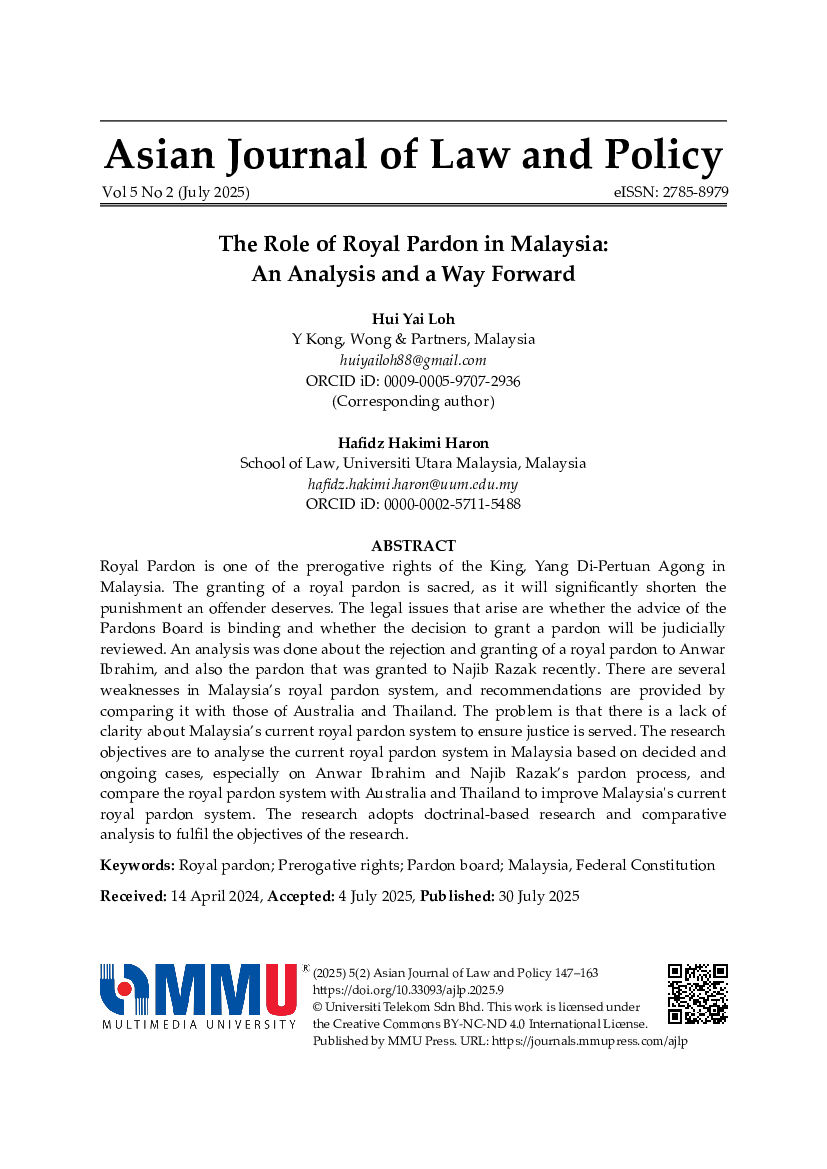The Role of Royal Pardon in Malaysia: An Analysis and a Way Forward
Main Article Content
Abstract
Royal Pardon is one of the prerogative rights of the King, Yang Di-Pertuan Agong in Malaysia. The granting of a royal pardon is sacred, as it will significantly shorten the punishment an offender deserves. The legal issues that arise are whether the advice of the Pardons Board is binding and whether the decision to grant a pardon will be judicially reviewed. An analysis was done about the rejection and granting of a royal pardon to Anwar Ibrahim, and also the pardon that was granted to Najib Razak recently. There are several weaknesses in Malaysia’s royal pardon system, and recommendations are provided by comparing it with those of Australia and Thailand. The problem is that there is a lack of clarity about Malaysia’s current royal pardon system to ensure justice is served. The research objectives are to analyse the current royal pardon system in Malaysia based on decided and ongoing cases, especially on Anwar Ibrahim and Najib Razak’s pardon process, and compare the royal pardon system with Australia and Thailand to improve Malaysia's current royal pardon system. The research adopts doctrinal-based research and comparative analysis to fulfil the objectives of the research.
Article Details

This work is licensed under a Creative Commons Attribution-NonCommercial-NoDerivatives 4.0 International License.
References
Daniel Pascoe, ‘An Investigation of Clemency and Pardons in Death Penalty Cases in Southeast Asia from 1975-2009’ (DLawthesis, University of Oxford 2013) <https://ora.ox.ac.uk/objects/uuid:4b852f9a-455f-40ed 88ae889aae16e8c4/download_file?file_format=application%2Fpdf&safe_filename=THESIS01&type_of_work=Thesis>
Daniel Pascoe, ‘What the Rejection of Anwar Ibrahim's Petition for Pardon Tells Us About Malaysia's Royal Pardon System’ (2016) 18 Asian Pacific Law and Policy Journal 63 <https://heinonline.org/HOL/P?h=hein.journals/aplpj18&i=65>
Fauziah Hani binti Ahmad Fuzi, Abdul Rani bin Kamarudin and Muhammad ‘Azzam bin Zainal Abidin, ‘Pardon, Parole, and Remission: The Inmates’ Second Chance’ [2018] 1 Legal Network Series(A) lxxi < https://www-cljlawcom.eu1.proxy.openathens.net/Members/DisplayArticle.aspx?ArticleId=132251735&SearchId=4mmu1>
Hoong Phun Lee, ‘Hereditary Rulers and Legal Immunities in Malaysia’ (1993) 12(2) University of Tasmania Law Review 323 <https://heinonline.org/HOL/P?h=hein.journals/utasman12&i=329>
Kanokpun Kalyanasut and Atchara Suriyawong, ‘The Criminal Justice System And Community-Based Treatment Of Offenders In Thailand’ 121st International Training Course Participants’ Papers <https://www.unafei.or.jp/publications/pdf/RS_No61/No61_22PA_Suriyawong.pdf>
Majdah Zawawi and Nasimah Hussin, ‘Forgiving the Enemy: A Comparative Analysis of The Concept of Forgiveness in Shari’ah and Malaysian Law’ (2015) 23 Pertanika Journal of Social Sciences and Humanities 43 <http://irep.iium.edu.my/id/eprint/4554>
Marvin E Wolfgang, ‘Murder, the Pardon Board, and Recommendations by Judges and District Attorneys’ (1959) 50(4) Journal of Criminal Law and Criminology 338 <https://scholarlycommons.law.northwestern.edu/cgi/viewcontent.cgi?article=4858&context=jclc>
Norchaya Haji Talib, ‘The Powers and Functions of the Pardons Board in Malaysia–A Review’ (Master of Laws thesis, University of Malaya 1989) <http://studentsrepo.um.edu.my/8203/1/The_Power_and_functions_the_pardons_board_in_malaysia.pdf>

